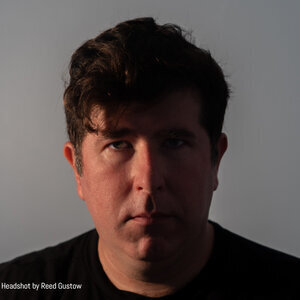It Skips a Generation, the latest powerful chapbook from prolific poet, Alison Lubar, explores the legacy of intergenerational trauma. The trauma being caused in large part by their ancestors being interred at Tule Lake Relocation Center during World War II. As defined by the website, https://www.verywellhealth.com/, intergenerational trauma is a theory that posits trauma can be inherited due to epigenetic changes in an individual’s DNA. Epigenetic changes refer to how a body decodes a DNA sequence. Lubar, as narrator, takes their reader on a journey spanning nearly a century (1930-2022) to get at the root of their own DNA sequencing. While reading this profound work, my proverbial jaw often dropped to the pressurized wood floor. I hope to relay a few of those poetic sequences for you.
The title poem lays bare the throughline of this book as the narrator sifts through photographs of their grandfather (“Oji” named “Jack”.)
I still want to call him Oji but showing
that I know he’s in me and in my own cruelty
is a cruelty I can’t show to my mother, who
suffered the most under him.
Lubar hears from their relatives that Oji was handsome, although “Handsome is never harmless.” It is only towards the bottom of the photograph stack that an intergenerational epiphany arises: “And then I see, second to last, my mother’s four-year-old face/ frozen in terror in her backward glance at Jack. I shouldn’t want/ anyone to look at me like that. But I know I inherit it all.”
It Skips a Generation confronts the obscene inequity of the internment of Japanese Americans during World War II in “For the No-Nos.” The brief lines and rapid-fire staccato precision fully illustrate the losses of their family and all citizens wrongfully interned at Tule Lake. “Sterno/ distributed monthly, each inferno/ rekindles what’s lost: grannie’s kimono,/ the house, a hundred pounds.” In this poem, Lubar sustains an assonant “o” that is an aural echo of loss, for merciless fate, trauma, the void, the body as site of political attack, and, finally, the hydrogen bombs dropped in 1945:
Each body is a composite of amino
acids, chemicals. Atomic eternity. No-
thing else persists. No-
minal freedom. No
destiny manifest. No-
where. Hydrogen. No
body. Bomb. No
more.
An antidote to both intimate and large-scale cruelty is love. With a generous poetic spirit, Lubar includes “Love can look like” that lists the objects that have meant love to them and their family:
painted irises
on a silk scarf
from the museum
giftshop, Irish wool
berets, three cards
on my birthday, the other two
from the grandmothers
when they couldn’t write anymore.
This poem concludes the chapbook on a note of hope and a way to push past the trauma.
William Faulkner famously once said, “The past is never dead. It’s not even past.” This quote is applicable to “Nothing Skips a Generation,” the poetic counterpoint to “It Skips a Generation.” This poem that Lubar refers to as a temporal-diptych has one part with its metrical feet planted in 1945, and the other in 2015. Bracketed lines offer poetic, nay theatrical, asides and commentary. In part 1,
When the war was over,
[on paper] it wasn’t over.
There, we [became dust.
Here, we] returned to dust—
America was [a home
that held no home]
left.
The return home is contrasted to how Lubar feels about California and America as home
This still
isn’t the place for me. [Neither is the town
where I went to school.] When I say,
""I’m going home.” I mean to a person
We return to Auntie’s…
Lubar’s Auntie was interred with their grandfather and is a guiding light presence throughout. I mentioned the bracketed asides were theatrical earlier and that was quite deliberate. This assertive, aware, and stand tall poem ends with the lines:
when Auntie says, “You look like Jack,”
I don’t take it as an insult. I respond
[with the Scottish play], “What’s done
cannot be undone.”
Lubar’s chapbook can be compared to a river, or indeed a strand of DNA. It twists and winds its way though your eyes, your mouth (if you read poetry aloud), your mind, and your soul. Lubar’s ever present and ever-increasing talent will stun and surprise you with startling metaphors, sterling diction, and, quite simply, large heart. I cannot recommend It Skips a Generation highly enough. You will not forget it.
Sean Hanrahan is a Philadelphian poet originally hailing from Dale City, Virginia. He is the author of the full-length collection Safer Behind Popcorn (2019 Cajun Mutt Press) and the chapbooks Hardened Eyes on the Scan (2018 Moonstone Press) and Gay Cake (2020 Toho). His work has also been included in several anthologies, including Moonstone Featured Poets, Queer Around the World, and Stonewall’s Legacy, and several journals, including Impossible Archetype, Mobius, Peculiar, Poetica Review, and Voicemail Poems. He has taught classes titled A Chapbook in 49 Days and Ekphrastic Poetry and hosted poetry events throughout Philadelphia.


